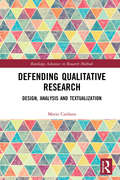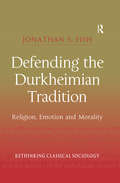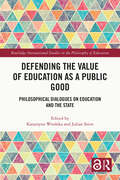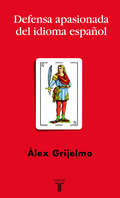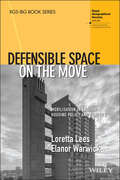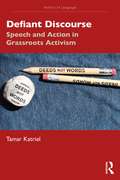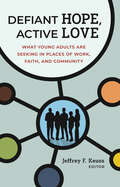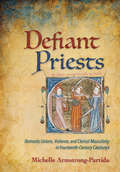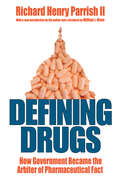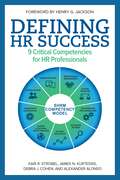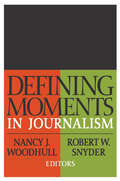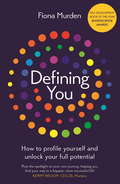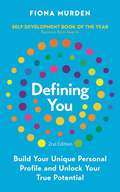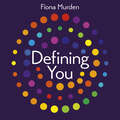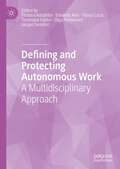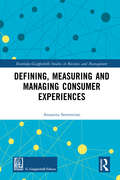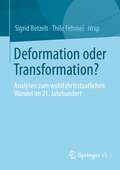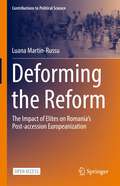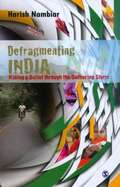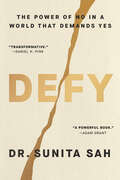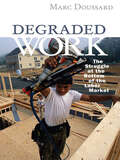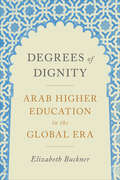- Table View
- List View
Defending Qualitative Research: Design, Analysis, and Textualization (Routledge Advances in Research Methods)
by Mario CardanoFocussing on the phases of qualitative research which precede and follow fieldwork – design, analysis, and textualization – this book offers new theoretical tools to tackle one of the most common criticisms advanced against qualitative research: its presumed lack of rigour. Rejecting the notion of “rigour” as formulated in quantitative research and based on the theory of probability, it proposes a theoretical frame that allows combining the goals of rigour and that of creativity through the reference to theory of argumentation. As such, it will appeal to scholars and students across the social sciences with interests in qualitative research methods.
Defending the Durkheimian Tradition: Religion, Emotion and Morality (Rethinking Classical Sociology)
by Jonathan S. FishThis book provides an exciting, accessible and wide-ranging guide to the development of classical and contemporary Durkheimian thought. Jonathan Fish offers a re-reading of the writings of Emile Durkheim and Talcott Parsons on religion. He aims to move beyond rationalistic readings which have neglected the key significance of collective human emotion in Durkheim's accounts of the link between society, religion and morality. He goes on to look at the development of these ideas in the work of Parsons and more recent Durkheimian thinkers. Making an important contribution both to studies of Durkheim and the Durkheimian tradition and to the sociology of emotion, the book is distinctive in arguing that religion is an essential backdrop for understanding emotion. In making this claim the author provides a key to re-establishing links between the sociology of religion and the wider discipline of sociology.
Defending the Value of Education as a Public Good: Philosophical Dialogues on Education and the State (Routledge International Studies in the Philosophy of Education)
by Julian Stern Katarzyna WrońskaCentred around a philosophical argument for contemporary education as a fundamental good, this edited volume demonstrates the benefits that education brings in a civil and flourishing societal context while also critiquing the state’s role in supporting and strengthening this educational focus.Chapters present in-depth philosophical and historical arguments that explore core aspects of education that are frequently overlooked, illustrating education’s role as a non-partisan public good during contentious times. Through this volume, diverse voices are heard from those with experience of life under communism as well as life in a stable democracy arguing, for example, that despite differing contexts, the value of education is autonomous and intrinsic. Ultimately drawing on conceptual frameworks, this timely volume reconciles the Anglo-American Continental dialogues on education and presents novel and challenging ideas to its readers.Striving to inspire new research through its various reflections on the relationship between education and the state, the book will be useful to scholars, researchers, and academics in the fields of philosophy of education, education policy, sociology of education as well as theory of education.The Introduction as well as Chapters 3, 5, 6 and 7 of this book are freely available as a downloadable Open Access PDF at http://www.taylorfrancis.com under a Creative Commons Attribution-ShareAlike (CC-BY-SA) 4.0 license.Chapter 9 of this book is freely available as a downloadable Open Access PDF at http://www.taylorfrancis.com under a Creative Commons Attribution-Non Commercial-No Derivatives (CC-BY-NC-ND) 4.0 license.
Defensa apasionada del idioma español
by Álex GrijelmoUna reivindicación del español, pero no a costa de otras lenguas sino en diálogo enriquecedor con todas ellas. El lector encontrará aquí una defensa. Nunca un ataque. El idioma español se ve rodeado ahora por los problemas en la educación escolar de sus hablantes, y por la fuerza colonial del inglés, y por la desidia de una gran parte de quienes tienen el poder político, informativo y económico en los veintiún países que asumen esta legua como propia. Nuestro idioma habrá de dar -sólo si empezamos a ser conscientes de los peligros que lo acechan- con los resortes adecuados para salir de esta situación que genera poco a poco un inmenso complejo de inferioridad de todo el mundo hispano frente al poderoso hombre anglosajón. Pero el progreso que aquí se plantea para la lengua española nunca deberá producirse a costa del catalán, del euskera, el gallego, el bable, el altoaragonés, el quechua, el araucano, el náhuatl, el mayo o yucateco, el otomí, el aimara, el guaraní, el quiché, el chaquiquel, el tarahumara... Ni siquiera a costa del inglés o del francés. Todas las lenguas atesoran un genio enterno que guarda las esencias de los pueblos que las hablan y las han hablado; jamás una lengua se debe utilizar contra otra. Con cada palabra que desaparece se pierde una idea crada por el ser humano.
Defensible Space on the Move: Mobilisation in English Housing Policy and Practice (RGS-IBG Book Series)
by Loretta Lees Elanor WarwickBoth theoretically informed and empirically rich, Defensible Space makes an important conceptual contribution to policy mobilities thinking, to policy and practice, and also to practitioners handling of complex spatial concepts. Critically examines the geographical concept Defensible Space, which has been influential in designing out crime to date, and has been applied to housing estates in the UK, North America, Europe and beyond Evaluates the movement/mobility/mobilisation of defensible space from the US to the UK and into English housing policy and practice Explores the multiple ways the concept of defensible space was interpreted and implemented, as it circulated from national to local level and within particular English housing estates Critiquing and pushing forwards work on policy mobilities, the authors illustrate for the first time how transfer mechanisms worked at both a policy and practitioner level Drawing on extensive archival research, oral histories and in-depth interviews, this important book reveals defensible space to be ambiguous, uncertain in nature, neither proven or disproven scientifically
Defiant Braceros: How Migrant Workers Fought for Racial, Sexual, and Political Freedom (The david J. Weber Series In The New Borderlands History Ser.)
by Mireya LozaIn this book, the author sheds new light on the private lives of migrant men who participated in the Bracero Program (1942-1964), a binational agreement between the United States and Mexico that allowed hundreds of thousands of Mexican workers to enter this country on temporary work permits. While this program and the issue of temporary workers have long been politicized on both sides of the border, the author argues that the prevailing romanticized image of braceros as a family-oriented, productive, legal workforce has obscured the real, diverse experiences of the workers themselves. Focusing on underexplored aspects of workers' lives--such as their transnational union-organizing efforts, the sexual economies of both hetero and queer workers, and the ethno-racial boundaries among Mexican indigenous braceros--author reveals how these men defied perceived political, sexual, and racial norms. Basing her work on an archive of more than 800 oral histories from the United States and Mexico, the author is the first scholar to carefully differentiate between the experiences of mestizo guest workers and the many Mixtec, Zapotec, Purhepecha, and Mayan laborers. In doing so, she captures the myriad ways these defiant workers responded to the intense discrimination and exploitation of an unjust system that still persists today.
Defiant Discourse: Speech and Action in Grassroots Activism
by Tamar KatrielIn this timely and innovative book, Tamar Katriel takes a language and discourse-centred approach to the subject of peace activism in Israel-Palestine, one of the most significant political issues of our time, while also posing more general questions about the role played by language in activist movements – how activists themselves conceptualize their speech and its relationship to action. Viewing activism as a globalized cultural formation that gives shape and meaning to grassroots organizations' struggles for political change, this book explores the relations between the cultural categories of speech and action as constructed and evaluated in activist contexts. It focuses on the specific empirical field of defiant discourse associated with the soldierly role in Israeli culture, using it to offer an in-depth exploration of the cultural underpinnings of defiant speech. Katriel interrogates discourse-centered activism as part of social movements' action repertoires on the one hand, and of the local cultural construction of speech cultures on the other. This is critical reading for all students and scholars studying activism and social movements within linguistics, Middle Eastern studies, peace studies, and communication studies.
Defiant Hope, Active Love: What Young Adults Are Seeking in Places of Work, Faith, and Community
by Jeffrey F. KeussCutting-edge social science research into what young adults want out of a faith community Purpose and meaning, healing and growth, community and fellowship—these values have traditionally been found in church. Though young adults are leaving the pews in droves, they are still seeking these spiritual benefits. How can churches entice them to return? Jeffrey F. Keuss thinks that&’s the wrong question to ask. Instead, his multigenerational team of scholars investigated how faith communities can make themselves more hospitable to the next generation of Christians. Backed by five years of qualitative and quantitative research, the Pivot NW research team offers practical recommendations for involving young adults in the community, including: • loosening demands for church membership • involving young adults in leadership earlier • addressing the economic difficulties of millennials • understanding religious trauma Defiant Hope, Active Love encourages church leaders to let go of nostalgia for old ecclesiological norms and embrace something new, inclusive, and authentic. With thorough research and incisive analysis, this groundbreaking book contains a wealth of resources to promote the health of faith communities.
Defiant Priests: Domestic Unions, Violence, and Clerical Masculinity in Fourteenth-Century Catalunya
by Michelle Armstrong-PartidaTwo hundred years after canon law prohibited clerical marriage, parish priests in the late medieval period continued to form unions with women that were marriage all but in name. In Defiant Priests, Michelle Armstrong-Partida uses evidence from extraordinary archives in four Catalan dioceses to show that maintaining a family with a domestic partner was not only a custom entrenched in Catalan clerical culture but also an essential component of priestly masculine identity.From unpublished episcopal visitation records and internal diocesan documents (including notarial registers, bishops' letters, dispensations for illegitimate birth, and episcopal court records), Armstrong-Partida reconstructs the personal lives and careers of Catalan parish priests to better understand the professional identity and masculinity of churchmen who made up the proletariat of the largest institution across Europe. These untapped sources reveal the extent to which parish clergy were embedded in their communities, particularly their kinship ties to villagers and their often contentious interactions with male parishioners and clerical colleagues. Defiant Priests highlights a clerical culture that embraced violence to resolve disputes and seek revenge, to intimidate other men, and to maintain their status and authority in the community.
Defining Drugs: How Government Became the Arbiter of Pharmaceutical Fact
by Richard Henry Parrish IIDrug-related morbidity and mortality is rampant in contemporary industrial society, despite or perhaps because, government has assumed a critical role in the process by which drugs are developed and approved. Parrish asserts that, as a people, Americans need to understand how it is that government became the arbiter of pharmaceutical fact. The consequences of our failure to understand, he argues, may threaten individual choice and forestall the development of responsible therapeutics. Moreover, if current standards and control continues unabated, the next therapeutic reformation might well make possible the sanctioned commercial exploitation of patients. In Defining Drugs, Parrish argues that the federal government became arbiter of pharmaceutical fact because the professions of pharmacy and medicine, as well as the pharmaceutical industry, could enforce these definitions and standards only through police powers reserved to government. Parrish begins his provocative study by examining the development of the social system for regulating drug therapy in the United States. He reviews the standards that were negotiated, and the tensions of the period between Progressivism and the New Deal that gave cultural context and historical meaning to drug use in American society. Parrish describes issues related to the development of narcotics policy through education and legislation facilitated by James Beal and Edward Kremers, and documents the federal government's evolving role as arbiter of market tensions between pharmaceutical producers, government officials, and private citizens in professional groups, illustrating the influence of government in writing enforceable standards for pharmaceutical therapies. He shows how the expansion of political rights for practitioners and producers has shifted responsibility for therapeutic consequences from individual practitioners and patients to government. This timely and controversial volume is written for the scholar and the compassionate practitioner alike, and a general public concerned with pharmacy regulation in a free society.
Defining HR Success: 9 Critical Competencies for HR Professionals
by Debra J. Cohen Alexander Alonso James N. Kurtessis Kari R. StrobeToday's HR professionals are expected to be valued team members and contribute as business partners, delivering strategic value and solving complex talent challenges to achieve growth for the organization.Defining HR Success provides a deep dive into the nine core competencies that define high-performing HR practitioners:· HR Expertise (HR Knowledge)· Business acumen· Communication· Consultation· Critical evaluation· Ethical practice· Global and cultural effectiveness· Leadership and navigation· Relationship managementThe book helps readers assess their current capabilities and build the skills needed to lead and influence within their organizations. With clear explanations and practical applications, it's an essential guide for aligning HR strategy with business growth and provides HR professionals with a roadmap for personal development and professional excellence in a rapidly evolving field.
Defining Moments
by Peter ShawOur lives are full of defining moments, but do we recognize them? We often fail to appreciate the significance of these moments. At work the pressure can be relentless and we can fail to enjoy these moments. The author shows how to recognize and appreciate these moments, which in turn helps us to better cope during more difficult times.
Defining Moments in Journalism
by Robert W. Snyder Nancy J. WoodhullMost great transformations are not apparent as we live through them. Only in hindsight do individual moments acquire layers of meaning that give them great significance. Looking back is not something that comes naturally to journalists, immersed as they are in breaking events and relentless deadlines. But there is still good reason for journalists, scholars, and people who care about journalism to think about the critical episodes in its recent evolution. In Defining Moments in Journalism, such authors vividly describe episodes of this kind. Some of the chapters and contributors include: "The Lessons of Little Rock" by Harry S. Ashmore; "Vietnam and War Reporting" by Peter Arnett; "Photo-journalists--Visionaries Who Have Changed Our Vision" by Jane M. Rosett; "The Weight of Watergate" by Ellen Hume; "Women Sportswriters--Business as Usual" by Mary Schmitt; "The Connie Chung Phenomenon" by Somini Sengupta; and "Covering Politics--Is There a Female Difference?" by Judy Woodruff. The years since the Great Depression and World War II have seen vast changes in America and also in its journalism. Journalists' relationship to power and authority is more complex; the press corps has become more diverse; the technology of news reporting is almost unrecognizably different from that of fifty years ago; and economic reorganization of the media has bundled news and entertainment organizations into conglomerates of extraordinary size. 'Defining Moments in Journalism' is a fascinating read for communications scholars and professionals, historians, and political scientists.
Defining You: How to profile yourself and unlock your full potential - SELF DEVELOPMENT BOOK OF THE YEAR
by Fiona Murden* SELF DEVELOPMENT BOOK OF THE YEAR 2019, BUSINESS BOOK AWARDS* Have you ever wondered what a profiling session would tell you about yourself? Fiona Murden helps some of the most successful people in the world to understand their behaviour and improve their performance. Here she guides you through the professional profiling assessment process in private, to help you discover your strengths, understand what really drives you and learn which environments will help you to excel. Step by step you will build your unique personal profile. Use the questionnaires in the book, run a 360 assessment, draw up your early years timeline and enjoy some valuable self-reflection. Fiona then expertly - and sensitively - coaches you through interpreting your results and taking your next steps to fulfil your potential. Our behaviour is at the core of what we do. This is your ultimate self-awareness toolkit to help you understand both your own and other's behaviour and to positively influence it. Along the way you may even start to sleep better, think more clearly and have good moods more often. Defining You opens a window into the elite process of psychological profiling and presents a clear path to improving your effectiveness with immediate actions and tangible tips.A NOTE FROM THE PUBLISHER: Dear reader, please note that the Credo test and participant report featured in Chapter 5 of Defining You is no longer available free of charge to readers. We trust this will not spoil your enjoyment of the book.
Defining You: How to profile yourself and unlock your full potential - SELF DEVELOPMENT BOOK OF THE YEAR
by Fiona MurdenWinner of Self Development Book of the Year - The Business Book AwardsMAKE SENSE OF YOUAs a psychologist, Fiona Murden helps smart people to improve their performance. Through a series of insightful questions, she will seek out their strengths, limitations and motivations to decode what it is that really drives them and what environments they will thrive in. All while putting them at ease, so she can create their truest personality profile.By mapping out this process of self-reflection in this award winning book, she has enabled all of us to explore our own stories and to live life with confidence in who we are and in knowing what works best for us. Since its first publication, Defining You has been awarded both the Self Development Book of the Year and the Axiom Business Book Award.Using this series of expert tools, let Fiona help you to get to know yourself better, understand what really makes you tick, and reach your full potential in life and work.With chapters on The Story of You, Describing You, Developing You, Confidently You and Optimising You, this fully revised and updated second edition also includes:- A look at your emotional resilience - coping with challenges and setbacks is a key factor in managing our daily lives and governing our decisions.- A more in-depth exploration of mental health and how it affects focus and high performance.- A fully revised chapter on sleep and stress relief.- An introduction of the 3 S's concept - Sleep, Self Awareness and Social Support.'Puts the spotlight on your own journey, helping you find your way to a happier, more successful life' Kenny Wilson, CEO, Dr Martens'Whoever you are, and whatever point you find yourself, here's a bespoke map for what happens next' Jon Hendry, CEO, Prezzo Ltd'Highly recommended for anyone serious about understanding themselves and becoming the very best they can be'Jo Warmsley, HR Director, Waitrose
Defining You: How to profile yourself and unlock your full potential - SELF DEVELOPMENT BOOK OF THE YEAR
by Fiona MurdenDefining You is the shortcut to psychological profiling for professionals and business leaders, complete with tests, analysis and guidance.SELF DEVELOPMENT BOOK OF THE YEARHave you ever wondered what a profiling session would tell you about yourself? Fiona Murden helps some of the most successful people in the world to understand their behaviour and improve their performance. Here she guides you through the professional profiling assessment process in private, to help you discover your strengths, understand what really drives you and learn which environments will help you to excel. Step by step you will build your unique personal profile. Complete the questionnaires, run a 360 assessment, draw up your early years timeline and enjoy some valuable self-reflection. Fiona then expertly - and sensitively - coaches you through interpreting your results and taking your next steps to fulfil your potential.Our behaviour is at the core of what we do. This is your ultimate self-awareness toolkit to help you understand both your own and other's behaviour and to positively influence it. Along the way you may even start to sleep better, think more clearly and have good moods more often.Defining You opens a window into the elite process of psychological profiling and presents a clear path to improving your effectiveness with immediate actions and tangible tips.A NOTE FROM THE PUBLISHER:Dear listener, please note that the Credo test and participant report featured in Chapter 5 of Defining You is no longer available free of charge. We trust this will not spoil your enjoyment of the audiobook.(P) 2019 Hodder & Stoughton Ltd
Defining and Protecting Autonomous Work: A Multidisciplinary Approach
by Tindara Addabbo Edoardo Ales Ylenia Curzi Tommaso Fabbri Olga Rymkevich Iacopo SenatoriThis book, adopting a multidisciplinary approach, investigates the definition of autonomous work and the kind of protection it receives and should receive in a global perspective. The book advocates for the existence of genuine autonomous work to be distinguished from employment and false self-employment. It deserves specific attention from legislators in the view of removing any obstacles to the exercise of freedom of association and collective action at large. The book is divided into two parts. The first focuses on the evolving notion of autonomy and its consequences on social protection, offering a theoretical frame from an organizational, political and legal point of view. The second aims at discovering new regulatory and protective horizons for autonomous work, in the light of blockchain, platform work, EU Competition Law, social security and liberal professions. Finally, the authors offer insights and recommendations on how to protect work beyond categories.
Defining the Age: Daniel Bell, His Time and Ours
by Paul Starr Julian E. ZelizerThe sociologist Daniel Bell was an uncommonly acute observer of the structural forces transforming the United States and other advanced societies in the twentieth century. The titles of Bell’s major books—The End of Ideology (1960), The Coming of Post-Industrial Society (1973), and The Cultural Contradictions of Capitalism (1976)—became hotly debated frameworks for understanding the era when they were published. In Defining the Age, Paul Starr and Julian E. Zelizer bring together a group of distinguished contributors to consider how well Bell’s ideas captured their historical moment and continue to provide profound insights into today’s world. Wide-ranging essays demonstrate how Bell’s writing has informed thinking about subjects such as the history of socialism, the roots of the radical right, the emerging postindustrial society, and the role of the university. The book also examines Bell’s intellectual trajectory and distinctive political stance. Calling himself “a socialist in economics, a liberal in politics, and a conservative in culture,” he resisted being pigeon-holed, especially as a neoconservative.Defining the Age features essays from historians Jenny Andersson, David A. Bell, Michael Kazin, and Margaret O’Mara; sociologist Steven Brint; media scholar Fred Turner; and political theorists Jan-Werner Müller and Stefan Eich. While differing in their judgments, they agree on one premise: Bell’s ideas deserve the kind of nuanced and serious attention that they finally receive in this book.
Defining, Measuring and Managing Consumer Experiences (Routledge-Giappichelli Studies in Business and Management)
by Annarita SorrentinoThis book offers a comprehensive overview of the challenges that marketing faces in understanding, managing and measuring the dynamics of modern consumer behaviours and successfully managing the customer experience. The reader will gain a deeper knowledge of the approaches to consumer behaviour and learn about the theoretical and empirical challenges of studying customer experience management. It also considers the post-modern consumer, which requires a move beyond the purely rationalist perspective of traditional marketing and provides methodological support for firms and scholars who wish to measure cognitive, emotional and behavioural consumer reactions. More specifically, it explores the changes in consumer behaviours, the limitations of traditional measurement approaches and the importance of capturing small insights with neuromarketing metrics, with a chapter contributed by a leading expert. A new three-point perspective on consumer behaviours is set out that combines behaviour (what people do) with the declared (what people say) and the perceived (what people feel). This approach acknowledges the complexity of consumer behaviours and the methodological bias derived from the use of the traditional techniques (principally the survey) or from big data. Only a holistic perspective can capture the heterogeneous nature of consumer behaviour. The book thereby takes up the theoretical debate about the definition, management and measurement of customer behaviour. It also examines measurement methodologies, an area that has received little attention elsewhere. Besides addressing the scientific community in the field, the book will also be a valuable practical resource for marketing managers, entrepreneurs and consultants who want to implement innovative strategies to manage the customer experience.
Deformation oder Transformation?: Analysen zum wohlfahrtsstaatlichen Wandel im 21. Jahrhundert
by Sigrid Betzelt Thilo FehmelDer Sammelband verfolgt die Idee, beobachtbare De- und Transformationen der Wohlfahrtsproduktion sichtbar zu machen und daraufhin zu prüfen, wie grundlegend und wie nachhaltig sie jeweils sind. Analytisch werden dabei verschiedene Aspekte des Wandels resp. Ebenen unterschieden, auf denen sich De- und Transformationen der Wohlfahrtsproduktion manifestieren (können): der Wandel sozialpolitischer Ziele, Normen und Leitbilder, der Wandel von Akteurs- und Steuerungskonstellationen bei der Wohlfahrtsproduktion, Transformationen auf Ebene der Subjekte im transformierten Wohlfahrtsstaat und schließlich alternative Modelle der Wohlfahrtsproduktion und der sozialen Sicherung.
Deforming the Reform: The Impact of Elites on Romania’s Post-accession Europeanization (Contributions to Political Science)
by Luana Martin-RussuThis open access book presents an actor-centered study on Europeanization, based on the assumption that EU-driven reforms are highly dependent on the behavior and interests of the key domestic actors. Whether or not a state pursues a European and democratic agenda depends on domestic lawmakers. Further, political elites are pre-eminent in deciding on the nature, form and content of any law, and on the extent to which the rule of law is actually enforced. Elites can overcome structural or institutional barriers that stand in the way of achieving their goals. The empirical study on Romania presented here lends this observation a more profound meaning: it shows how, in contexts where high level corruption is the norm rather than the exception, self-serving political elites cannot be expected to genuinely commit to adopting sound anti-corruption reform. The book is an inquiry into the motivations that drive legislators to make particular decisions, but also into the structural characteristics and dynamics of the elite that invite a selfish rather than responsible and responsive behaviour.This publication was supported by funds from the Publication Fund for Open Access Monographs of the Federal State of Brandenburg, Germany.
Defragmenting India
by Harish NambiarDefragmenting India is an account of the various fault lines of Indian society quivering in the temblors that the 2002 Hindu-Muslim communal riots of Gujarat sent across the nation. The riots form the dramatic backdrop to the travelogue narrative of a motorbike trip of the author and his friend. The book maps the urban consciousness of India by juxtaposing lives, issues and situations of educated and the uneducated, craftsman and conservationist, teacher and businessman, daughters and drunks from small towns and non-metro cities of India. The narrative uses oral history, folklore, local legends, historical events, research papers, imaginative speculations, biographic anecdotes and graphic reportage in an elliptical and poetic narrative to weave a picture of a country in flux.
Defy: The Power of No in a World That Demands Yes
by Dr. Sunita SahWhy is it so hard to speak up, even when we know something&’s wrong?This is the definitive book on defiance, a clear-eyed dissection of the forces that silence us, featuring groundbreaking research and legendary stories alongside everyday examples and strategies for how to unleash the power of a &“True No.&”Many of us comply much more than we realize. How many times have you wanted to object, disagree, or opt out of something but ended up swallowing your words, shaking your head, and just going along? Analyzing cases ranging from corporate corruption and sexual abuse to everyday acquiescence at work, the doctor&’s office, and in our personal lives, award-winning organizational psychologist Dr. Sunita Sah delves deep into why the pressure to comply is a corrosive and often invisible force in our society.With her own revelatory research, she radically transforms our idea of defiance from a misunderstood negative trait into a crucial, positive force for personal and societal change. Taking us through her five stages of defiance, Dr. Sah equips readers with simple tools to make decisions that align with their values. Defy is the essential playbook for how to speak up and act when it matters most.
Degraded Work: The Struggle at the Bottom of the Labor Market
by Marc DoussardCritics on the left and the right typically agree that globalization, the loss of manufacturing jobs, and the expansion of the service sector have led to income inequality and rising numbers of low-paying jobs with poor working conditions. In Degraded Work, Marc Doussard demonstrates that this decline in wages and working conditions is anything but the unavoidable result of competitive economic forces. Rather, he makes the case that service sector and other local-serving employers have boosted profit with innovative practices to exploit workers, demeaning their jobs in new ways—denying safety equipment, fining workers for taking scheduled breaks, requiring unpaid overtime—that go far beyond wage cuts. Doussard asserts that the degradation of service work is a choice rather than an inevitability, and he outlines concrete steps that can be taken to help establish a fairer postindustrial labor market. Drawing on fieldwork in Chicago, Degraded Work examines changes in two industries in which inferior job quality is assumed to be intrinsic: residential construction and food retail. In both cases, Doussard shows how employers degraded working conditions as part of a successful and intricate strategy to increase profits. Arguing that a growing service sector does not have to mean growing inequality, Doussard proposes creative policy and organizing opportunities that workers and advocates can use to improve job quality despite the overwhelming barriers to national political action.
Degrees of Dignity: Arab Higher Education in the Global Era
by Elizabeth BucknerPresenting an analysis of higher education in eight countries in the Arab Middle East and North Africa, Degrees of Dignity works to dismantle narratives of crisis and assert approaches to institutional reform. Drawing on policy documents, media narratives, interviews, and personal experiences, Elizabeth Buckner explores how apolitical external reform models become contested and modified by local actors in ways that are simultaneously complicated, surprising, and even inspiring. Degrees of Dignity documents how the global discourses of neoliberalism have legitimized specific policy models for higher education reform in the Arab world, including quality assurance, privatization, and internationalization. Through a multi-level and comparative analysis, this book examines how policy models are implemented, with often complex results, in countries throughout the region. Ultimately, Degrees of Dignity calls on the field of higher education development to rethink current approaches to higher education reform: rather than viewing the Arab world as a site for intervention, it argues that the Arab world can act as a source for insight on resilient higher education systems.
